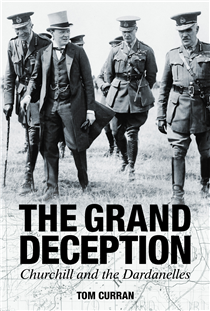It will come as no surprise that this book lays responsibility for the Dardanelles campaign of 1915 at Winston Churchill’s feet. Unpublished and other archival evidence is used to tell the fascinating tale of how and why the then young political wizard managed to push through this disastrous campaign from inception to completion against the best military advice available at the time.
Motivated by an unbridled passion for power and glory with an almost gleeful love of war, Churchill used his oratory power to cajole, browbeat, deceive and lead by the nose a weak Prime Minister (Asquith) and a War Cabinet to sometimes approve, sometimes acquiesce but never decline an ever escalating commitment to the Dardanelles campaign. This was against the heartfelt advice of the two most respected service leaders of the time; Lords Fisher and Kitchener, heads of the Royal Navy and British Army respectively. Fisher suffered the double ignominy of having Churchill virtually take over the Royal Navy operations and run it disastrously as his personal fiefdom without reference to any of the naval experts. Churchill directed navy operations to capture the Dardanelles and its failure escalated into the events at Gallipoli. When it came to wartime operations, Churchill had an almost mystical belief in his own powers to out think the experts on matters he knew nothing about, coupled with a losing gambler’s inclination to double down and a realistic belief in the power of his oratory to save his skin.
And save his skin he did. It is not for nothing that Churchill said “History will be kind to me for I intend to write it.” After being the acknowledged villain of the Dardanelles campaign immediately after the event, by writing The World Crisis in 1923, Churchill made himself the hero and Fisher, Kitchener and others the scapegoats. Churchill’s reputation as a true politician-of-war was established.
Whilst Churchill is the central character of this book, this is not a Churchill biography. Rather it is a step by step analysis of how a deeply flawed governance system was subverted to one man’s ends, dragging an Empire into a fight that only he wanted. A fight that the experts knew had little chance of success.
The book contains interesting perspectives on what both Kitchener and Fisher considered the proper use of the Royal Navy in support of land operations and the tactics that should apply. Needless to say, those tactics were ignored. It also contends that they never supported the Dardanelles campaign in the form it took but they, like the Prime Minister and the War Cabinet, were dragged along one fateful step at a time by Churchill. There is an extended section for the very interested in how the Dardanelles campaign story evolved in military histories to the present day and the long shadow of Churchill’s book on historical interpretations. This book will be a good source for scholars and committed readers of military history.

Contact Brent D Taylor about this article.






